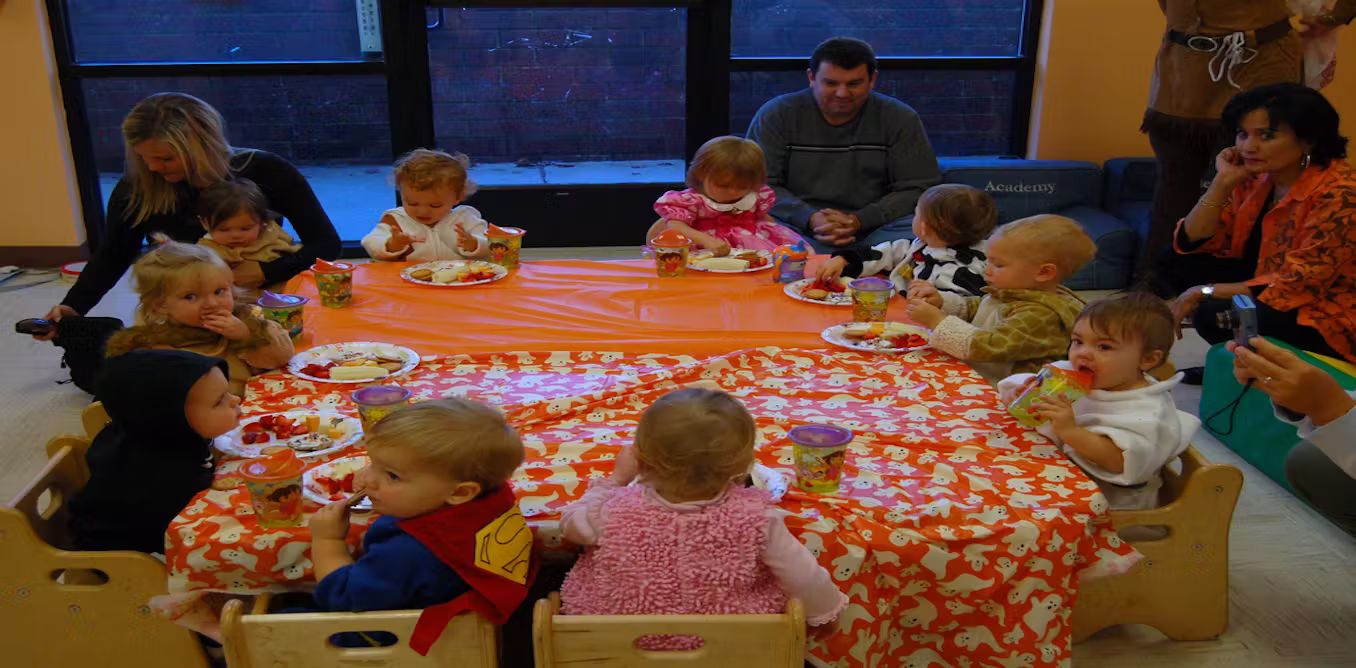
The first year of a child’s life unfurls as a truly remarkable period, brimming with both exciting transformations and moments that can feel incredibly overwhelming for parents, particularly those embarking on this journey for the very first time. It’s a time of profound growth, rapid learning, and countless unforgettable experiences that shape not only the baby but also the parents themselves. As Dr. Rob Sanchez eloquently puts it, “The first year can be overwhelming for parents, especially new parents, and we ourselves have had some of the same feelings, fears, and experiences as you, from sleepless nights to overjoyed moments when they do something new for the first time.” This shared experience is a testament to the universal nature of early parenthood.
Indeed, pediatricians and parents alike, such as Dr. Nina Alfieri and Dr. Rob Sanchez, offer invaluable insights into what this foundational year truly entails. They delve into everything from the crucial developmental milestones that babies achieve to practical, evidence-based tips designed to support a baby’s burgeoning growth. The wisdom shared comes not just from medical expertise but also from their own firsthand experiences, providing a relatable and comprehensive perspective on navigating the joys and challenges of raising a new child.
This comprehensive guide is designed to break down the complexities of the first year into easily digestible segments, offering a clear roadmap through the various stages of infancy. We’ll explore the signs to look for, the best ways to encourage your baby’s development, and crucially, when to know it’s time to reach out to your pediatrician for support. Get ready to dive into the incredible journey of your baby’s first year, armed with knowledge and confidence.
1. **Months 1-3: Awakening to the World – Milestones & Support**
The initial three months of a baby’s life are often described as a period of “awakening to the world,” a time when newborns gradually become more alert and start engaging with their surroundings in truly captivating ways. Dr. Nina Alfieri highlights the sweetness of this stage, noting how babies “start to wake up more to the world around them. They’re more alert, they’re making eye contact, and they’re showing signs of social engagement. And it’s so sweet because they start to coo and smile.” These early interactions lay the groundwork for their social and emotional development.
Key milestones during this time include brief head lifts during tummy time by the end of the first month, responding to familiar voices, and exhibiting that highly anticipated “first real social smile” by month two, a moment Dr. Rob Sanchez describes as “the best because you’ve been working hard for them, for, you know, for weeks at a time. And then they just start to smile and everything comes together.” Cooing sounds also emerge, and by month three, many babies will start turning towards sounds and visually tracking moving objects, demonstrating burgeoning cognitive and sensory awareness.
To help babies thrive in this crucial phase, parents can engage in several supportive activities. Daily tummy time is essential for building neck and shoulder strength. Talking and singing to your baby significantly aids early language development. Offering high-contrast toys, such as black and white cards, can stimulate their visual tracking, and making consistent eye contact fosters social skills. As Dr. Nina Alfieri recalls, her own girls “just stared at” a black and white pillow, underscoring the effectiveness of these simple engagements.

2. **Months 1-3: Early Concerns and Pediatrician Consultations**
While observing a baby’s rapid development is endlessly fascinating, it’s equally important for parents to be aware of certain signs that might warrant a conversation with their pediatrician. Early detection and intervention can be “game-changing for babies experiencing delays,” as emphasized by the experts. Trusting your instincts about your child’s development is paramount, and open communication with your healthcare provider is always encouraged.
Specifically, during the one to three-month age range, there are a few key indicators that parents should monitor and bring up with their pediatrician. These include if your baby is “not reacting to sound,” which could signal hearing concerns, or if they are “not focusing on faces or objects very well,” indicating potential visual development issues. The absence of a social smile by two to three months, or a lack of improvement in head control—meaning they aren’t able to “kind of really able to kind of lift it up off a mat”—is also an important signs that require professional evaluation.
Dr. Rob Sanchez stresses the importance of these observations, noting they “may be signs that are really important to discuss with your pediatrician because there could be some important interventions that we’re able to do for you and talk with you during that time.” Prompt action based on parental concern can unlock resources and support that can make a significant difference in a child’s developmental trajectory, ensuring they receive the specialized attention they may need.

3. **Months 4-7: Movement and Discovery – Key Milestones**
The period spanning months four to seven is characterized by an explosion of “exciting growth and discovery,” as babies become increasingly coordinated, expressive, and physically interactive with their environment. This is when the early efforts of tummy time and floor play truly begin to pay off, transforming infants into more active participants in their world. Every day can indeed feel like a new adventure as they unlock novel abilities.
During this exciting stage, babies begin to leverage their developing motor skills, often starting to roll over, which can happen in both directions, sometimes even in their sleep, as highlighted by Mayo Clinic Staff. They also commonly achieve the milestone of sitting with support, or even independently. The journey towards mobility intensifies, with many babies starting to scoot, rock back and forth, or even begin to crawl across the room, marking their transition into little explorers.
Beyond physical prowess, communication and interaction flourish. Babies start to chuckle and laugh out loud, bringing immense joy to their families. Babbling also emerges around six months, laying foundational sounds for later language. They refine hand-eye coordination, moving objects between hands and beginning to pick up items with their thumb and forefinger, skills crucial for future self-feeding. The world truly opens up as they engage more and more, making this a period rich with delightful discoveries.

4. **Months 4-7: Nurturing Growth and Safe Exploration**
As babies progress into the four to seven-month stage, their burgeoning mobility and curiosity necessitate thoughtful strategies to support their development while ensuring their safety. Creating an environment that encourages exploration without hazard is key. This means providing ample supervised floor time, allowing them to freely roll, play, and practice their newly acquired motor skills.
A significant development during this period is the introduction of solid foods, typically around six months, alongside continued breast milk or formula, which remains their primary nutrition source. This exciting step, which Dr. Nina Alfieri notes could fill an “entire episode,” becomes a positive and often hilarious family experience as babies encounter new tastes and textures. Recommendations include starting with iron-rich options and incorporating fruits and vegetables, encouraging a diverse palate from the outset.
Childproofing efforts become increasingly vital as babies learn to roll and move. Dr. Rob Sanchez wisely points out that “safety during that time” is paramount, stressing the need for close supervision on high surfaces to prevent falls. Beginning the process of childproofing the home before babies become fully mobile is a proactive measure, ensuring that the environment is safe as their abilities and reach expand. This includes being mindful of anything they might be able to grab or get within their reach, creating a secure space for their adventurous spirits.

5. **Months 4-7: Recognizing Developmental Red Flags**
While every baby develops at their own unique pace, there are certain developmental benchmarks during the four to seven-month period that, if not met, should prompt a discussion with your pediatrician. Being proactive about potential concerns is a cornerstone of positive parenting, as early intervention can significantly impact a child’s long-term development. Your pediatrician is a crucial partner in monitoring your baby’s progress.
Specific signs to watch for in this age group include a baby “not seeing them being able to reach for objects,” or showing little effort in doing so. Persistent difficulty with head control, where they still require significant support when held or struggle to turn their head, is another important indicator. Concerns also arise if a baby is “not really making good chuckles, laughter, other kinds of vowel sounds or cooing sounds,” which are important precursors to language development.
Furthermore, if your baby appears “disengaged from the caregivers or their toys,” this lack of interaction can be a cause for concern. Dr. Rob Sanchez confirms that any of these observations “would be a good thing to bring up to the pediatrician because again, it could be a marker that they may need some extra support or focused attention to help with those developmental areas.” Pediatricians are well-equipped to discuss these concerns, provide reassurance, and connect families with the necessary resources and support to address any emerging developmental needs.

6. **Memorable Moments of the Early Months (1-7): Joy and Laughter**
Beyond the impressive array of developmental milestones, the first seven months of a baby’s life are truly defined by the explosion of new interactions and the sheer joy they bring to parents. These aren’t just developmental steps; they’re the building blocks of cherished family memories, filled with laughter, discovery, and sometimes, a little mess. Experiencing these moments firsthand adds an immeasurable richness to the parenting journey.
From the earliest days, simple activities transform into profound connections. Dr. Rob Sanchez fondly recalls his “tummy time” coaching, setting up mirrors and toys, and watching his firstborn lift his head, looking from one mirror to the next. This dedicated play not only builds strength but creates those small, intimate victories. Dr. Nina Alfieri shares a relatable memory of “eating dinner while holding the babies,” a common reality for parents, where even mealtimes turned into a humorous spectacle of “various food hats.
As babies grow, their capacity for expressing joy becomes infectious. The “chuckles” are a milestone that melts hearts and often inspires parents to go to great lengths to elicit them. Dr. Nina Alfieri recalls singing “all kinds of songs” for those first belly laughs, noting “they were just the best.” Dr. Rob Sanchez’s memories often revolve around the “first food introduction,” noting the “hilarious” faces babies make when trying new tastes like eggs or avocado, perfectly capturing the relatable chaos and humor of early parenting. These authentic moments remind us that while the journey has its challenges, it is ultimately profoundly rewarding.
As your baby rounds the corner into the dynamic final five months of their first year, from month eight through twelve, they truly transform into a ‘little explorer with a big personality.‘ This period is marked by an incredible surge in mobility, curiosity, and increasingly clear communication. It’s a thrilling home stretch where babies consolidate previous learnings and burst forth with new capabilities, testing boundaries and clearly showing their preferences.
This stage is not just about physical growth; it’s a vibrant display of blossoming cognitive and social-emotional development. The foundation laid in the earlier months now allows for more complex interactions and a deeper understanding of the world around them. Parents often find themselves amazed by the rapid evolution of their child’s abilities and character during these months.

7. **Months 8-12: The Emergence of Mobility and Personalities**
The period from eight to twelve months is a significant developmental leap, often ushering in new forms of mobility. Many babies at this stage begin to crawl, marking a dramatic increase in their ability to explore their environment independently. This newfound freedom fuels their curiosity and allows them to actively engage with objects and spaces in ways previously impossible.
Beyond crawling, babies might start to pull themselves up to a standing position, often ‘cruising’ along furniture as they gain confidence and balance. For some, this exciting period culminates in those unforgettable first steps, a monumental milestone that truly signifies their journey into independent movement. These physical achievements are not just about getting around; they are crucial for cognitive development, as babies learn about spatial relationships and cause and effect through active exploration.

8. **Months 8-12: Communication Blossoms and Interactive Play**
Communication takes on new dimensions during these final months of the first year. While earlier months saw cooing and babbling, this stage often brings the emergence of recognizable words like ‘Mama’ and ‘Dada,’ bringing immense joy to parents. Babies also become more adept at non-verbal communication, often waving ‘bye-bye,’ clapping their hands, and playing interactive games.
Classic games such as peek-a-boo and patty-cake become immensely popular, reinforcing social and communication skills while strengthening the bond between baby and caregiver. These playful interactions aren’t just fun; they teach crucial concepts like object permanence and reciprocal communication. Babies also begin to understand simple words and routines, demonstrating a growing cognitive grasp of their daily world.

9. **Childproofing Your Home for the Mobile Infant**
With a baby who is crawling, cruising, or even taking first steps, childproofing transforms from a suggestion into an absolute necessity. As the ‘little one’s curiosity soars,’ so does their ability to reach, grab, and explore anything within their grasp. Creating an exploration-safe environment is paramount to prevent accidents and ensure your baby can discover safely.
This involves diligently surveying your home for potential hazards and taking proactive measures. Key steps include moving anything poisonous, small objects that could pose a choking hazard, or items that could break into small pieces, out of reach. Covering electrical outlets, installing stairway gates, and using gates between rooms to keep your fast-moving baby in safe areas are crucial. Additionally, securing cords from blinds or shades, installing child locks on doors and cabinets, and removing furniture with sharp edges from play areas are vital precautions. Mayo Clinic Staff emphasize anchoring bookcases, televisions, and their stands to the wall to prevent them from tipping over, ensuring a secure space for your adventurous baby.

10. **Recognizing and Addressing Developmental Concerns (Months 8-12)**
While every child develops at their unique pace, and ‘development is such a tricky topic because it really goes in leaps and bounds,’ there are specific developmental benchmarks for the 8-12 month period that warrant a conversation with your pediatrician if unmet. Parents know their kids best, and trusting your instincts is crucial for early detection of potential delays. As Dr. Nina Alfieri notes, ‘there’s such a benefit to having early therapy.’
Specific signs to watch for by the 12-month mark include whether your baby isn’t crawling or not bearing weight on their legs. While walking independently has a wide range (9-18 months), lack of crawling or weight-bearing by 12 months should be discussed. Communication concerns also arise if a baby doesn’t seem to respond to their name, doesn’t use common gestures like pointing or waving, or shows a general lack of interest in interactions. Crucially, if a baby loses previously learned skills—such as being able to sit independently but suddenly can no longer—this is a significant red flag that requires immediate pediatrician consultation, as highlighted by Dr. Rob Sanchez.

11. **Nurturing Growth with Positive Parenting Strategies**
Parents are indeed the ‘most important first teachers the baby will ever have,’ and positive parenting strategies play a pivotal role in fostering a baby’s comprehensive development during this period. Engaging with your baby through interactive play like patty-cake and peekaboo reinforces essential social and communication skills. Reading books daily, even for just a few minutes, is a powerful way to boost language development and create bonding moments.
Dr. Rob Sanchez emphasizes ‘narrating the day’ to your baby, describing actions and objects, which maximizes language exposure. Encouraging simple problem-solving with toys like stacking blocks or sorting shapes, or even using everyday household items like Tupperware and cardboard boxes, can be incredibly beneficial. These simple, consistent interactions provide a rich learning environment and build self-confidence as babies discover how to make things happen.

12. **Essential Health and Safety Measures for Your Growing Baby**
Beyond developmental milestones and active play, ensuring comprehensive health and safety remains a top priority as your baby approaches their first birthday. Nutrition continues to be key; while solid foods introduce new tastes and textures, breast milk or formula remains a primary source of nutrition between 6 and 12 months. Feeding babies slowly and patiently, encouraging new tastes without force, is recommended.
Safety measures extend to preventing choking by cutting food into small, manageable bites and keeping small toys or objects that could be swallowed out of reach. Ensuring babies do not play with anything that could cover their face, and never carrying hot liquids or foods near them, is vital. Staying up-to-date on vaccinations is critical for protecting your child from serious diseases. The National Highway Traffic Safety Administration recommends placing your baby in a rear-facing car seat in the back seat when riding in a car, a non-negotiable safety practice. Additionally, limiting screen time for children under 18 months, as recommended by the American Academy of Pediatrics, and ensuring 12-16 hours of sleep within 24 hours (including naps), contributes significantly to their overall health and well-being.
The first year of a baby’s life is undeniably a marathon, a whirlwind of sleepless nights, rapid growth, and countless ‘firsts’ that are etched into a parent’s memory forever. As Dr. Rob Sanchez often congratulates parents at the one-year visit, saying, ‘Hey, congratulations, you did it the first year,’ it’s a testament to the dedication, resilience, and boundless love that defines early parenthood. From those first coos to the wobbly first steps, each milestone is a celebration, and every challenge overcome builds strength. The journey through infancy is complex, unpredictable, and profoundly rewarding, solidifying bonds and shaping futures in truly immeasurable ways. Keep cherishing every moment, for these foundational experiences lay the groundwork for a lifetime of growth and discovery.




